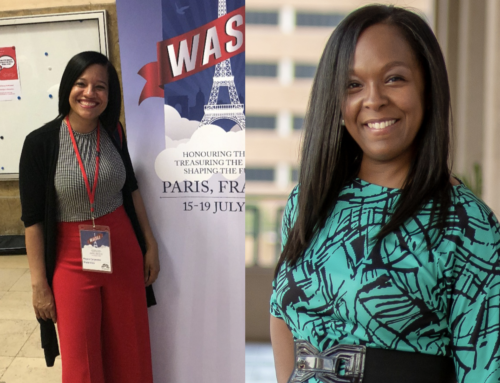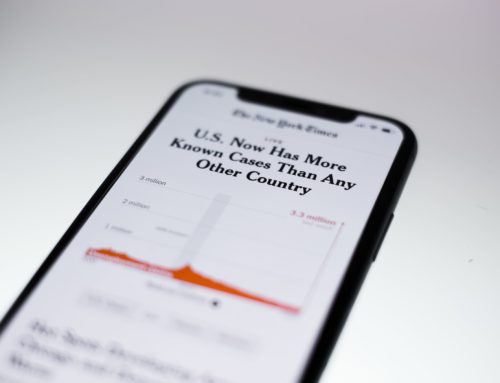Mastery in Mentoring: Lifelong Learning
Contributors: Betty Colonomos and Kelly Decker
Outlined below is an English version of the video article Mastery & Mentoring: Lifelong Learning. We suggest that you view the article in its original intended format, ASL, with this version as a supplement.
KD: Betty and I have collaborated on this article for the Mentoring edition of the VIEWS. We realize there are a variety of mentoring approaches and opportunities in our field. We wanted to share our experience and relationship with a particular kind of Mentoring.
BC: Yes, I would agree that there are a variety of approaches to mentoring. I see a distinct difference in the framework of mentoring that you and I are working with. Kelly, could you outline the difference?
KD: The first difference is that one approach is tied to measurable gains – for example, passing an exam, obtaining RID certification, or some other type of credential. These measurable goals are performance goals. They create a frame for specific targets for mentoring activity. Once the goal is obtained, the mentorship relationship often comes to an end.
The approach we use is a holistic view regarding both the task of interpreting and the interpreter. It is rooted in continuous learning and self-reflection with no fixed timeline for the mentoring relationship and no specific intended goal. This framework is a mastery framework. The mastery approach supports the interpreter’s journey of growth as a practitioner. This approach is reciprocal in nature, without any overt or direct teaching. It is a mutually beneficial partnership. This approach is what Betty and I have been utilizing for the past number of years. Both types of mentoring, performance and mastery, are necessary. Both approaches are significant to the development of an interpreter.
BC: If I may, I’d like to create an analogy to clearly delineate mastery and performance goals. I see a performance goal as akin to obtaining a driver’s license. You may have a goal to drive, and to do so you need a license. Once you pass the driver’s test, you’ve reached your goal. Whether you are a good driver or not – is another matter. Mastery, on the other hand, and who defines mastery, is determined by the end user’s (i.e. consumer’s) criteria. What a recipient of services deems as mastery in interpreting may be vastly different from what a performance test of interpreting measures.
Similarly, if I go to the doctor’s I can see that my doctor has a diploma verifying they graduated from medical school and they are licensed to practice. As we know all too well, not all doctors have the same abilities, expertise, or overall patient satisfaction even though they all ostensibly have some form of qualification. This idea led me to further my pursuit of the mastery approach to mentoring. I believe that by practicing a mastery model of mentoring, the attainment of performance goals will follow naturally. The opposite is not necessarily the case. A performance approach does not guarantee mastery.
KD: In addition to that, in my experience, mastery goals respect the person where they are in their development and involve a long-term commitment to the process and the relationship. This approach allows a person to reflect on where they are and where they have been to gain further insight into their own growth. Performance goals usually have a shorter, specified time for meeting the criteria set out in the goals. These differing expectations concerning longevity and reflection are the biggest differences I’ve noted between performance and mastery approaches.
BC: In my 35+ years of teaching it has become clear to me that telling people what to do, directing them to a particular answer, or coming from a place of evaluation does not bring our field forward in any way. I do recognize the value of exposure to ideas, but those ideas need to lead to critical thinking and self-reflection. Without self-inquiry and reflection we often see an academic, performance-driven measurement of knowledge without application. In order to become skilled in the task of interpreting, a person must internalize and understand their own processes for managing the operations required for the successful completion of a task.
An understanding of a person’s why – why they decided to do something, why something happened, etc . . . leads to the possibility of changing the how – how it was done, how something could be handled, etc… While mentoring I develop cognitive activities that help to discover why.
Another tool is dialogue. This particular practice of intentional dialogue is framed within the teachings of the Russian psychologist Lev Vygotsky. The cornerstone of Vygotsky’s theory of development is that in order to develop higher cognitive functions, a person must engage in active dialogue with another person.
KD: The practice of dialogue also includes the art and skill of listening. Truly listening with an open mind, without evaluation, is essential to this approach. Listening with respect allows the other person to be in the place where they are without judgment. There are no expectations imposed from the outside.
BC: I agree with you completely, listening is not as easy as it may seem. This all ties into that reflective practice we’ve been talking about. Another facet of dialogue and listening is the ability to seek clarification of ideas by asking probing questions that reflect back to the mentee. These tools promote discovery by the mentee in a non-evaluative way. On this journey there is an even playing field. The belief that both the mentor and mentee contribute to the mastery of one another is critical to the success of the mentoring relationship.
KD: I’d like to add that within the framework of dialogue there is an understanding that this journey is not a “quick-fix,” something readily changed within one conversation. Often these conversations leave a colleague thinking further about the conversation on their own, where new understandings of their work will come to them several days (or perhaps weeks) later.
BC: Absolutely…and that is where the notion of lifelong learning comes into play. More to your point, there are times where shifts in understanding of the work happen within a single conversation. As we have seen over the years…there are multiple ways to engage in learning and growth. All of these tools have developed through years of exploring what is happening in our minds while we are interpreting.
Interpreting is a series of decisions and the best way to examine those decisions is to talk about the why with the decision maker (the interpreter). Often a decision is made that may affect subsequent decisions, and the more we uncover these decisions, the more we are able to develop strategies and modifications that we can use in our work. Many times an interpreter’s decisions seem outside of their control. It could be that the rate of speed of a speaker drives the nature of the product, or that decisions are based on an emotional reaction to the content or something in the environment. Uncovering what stimulates interpreting decisions by themselves is fundamental to this process of reflective discovery.
Another important point I would like to address is that all too often I am told by interpreters that the environment where they talk about the work (i.e. a workshop, their interpreter training program, a group of colleagues) is not conducive to this type of dialogue. They sense a lack of trust and fellowship from their colleagues. Moreover, the conversations in these environments conflate the act of interpreting and the value of the interpreter as a person. Without separating the two (the work and the person) it is easy to understand why these conversations can be unwanted and unhealthy.
KD: This leads me back to our original thoughts about performance vs. mastery goals. The reason that an interpreter might feel negatively about a conversation is that the conversation is tied to the interpreter’s performance. The performance is evaluated as good or bad – which leads the person to feel good or bad about themselves. In my experience with a mastery approach to mentoring, I have yet to feel good or bad about the work I do. What I know is that my decisions are what they are and exploring why they happened is a cognitive, and not an emotional, activity.
BC: And that exploration is never-ending, which is why the practice and application of these tools is critical. Creating a safe container to explore the work, aside from the person, in a way that honors the journey is, exactly, mentorship in a mastery framework. Mind you, performance goals have a purpose and are important, particularly if someone’s job depends on obtaining some type of approval or endorsement. At the same time, they may be limiting the potential to go further as they are bounded by the exact thing they want to achieve. Mastery approaches follow the person and their journey without bounds.
Performance goal-setting is integral to America’s society and educational system. Throughout K-12 schooling, we understand that grades are important and the need to pass through the hierarchical system. It is understandable that we would be quick to apply this same philosophy to our professional practice. With decades of experience in this field, I am fairly certain performance goals alone do a disservice to the mastery of our craft. In closing, Kelly, could you talk about where our audience can find more information about the tools and philosophies we’ve outlined?
KD: As Betty and I have described, interpreters have been gathering for the past 15 years in Etna, New Hampshire to practice this dialogue and further refine the tools needed to engage in non-evaluative conversations. This group is called The Etna Project. We meet roughly four to five times per year and have had over 200 participants over the past 15 years. There are participants from all over the country who are familiar with this work and we are sure they would be eager to connect with you to talk more about Vygotsky and this approach to mentoring. If you would like to know more about The Etna Project and see past participants you can visit www.vistbmc.com.
BC: I hope after viewing this you may be interested in establishing a group of reflective practitioners in your area to honor the need for variety in both types of mentorship that come from performance- and mastery-based mentoring philosophies and practices.
Betty M. Colonomos currently serves as Director of the Bilingual Mediation Center and is a fluent ASL/English bilingual. Her academic training has been in Deaf Education/Speech Pathology (undergraduate), Counseling (graduate), and Linguistics (doctoral). Betty was awarded the Masters Comprehensive Skills Certificate (MCSC) from RID in 1980. She was the second recipient of the Mary Stotler Award for Excellence in Interpreter Education from CIT. Betty has chaired many national committees on standards and evaluation of interpreters. She recently served on RID’s Council of Elders. Ms. Colonomos is well-known as an educator of interpreters and a consultant. She has developed the most widely used model for teaching processes used in interpreting (Integrated Model of Interpreting – IMI). She is the founder of the Etna Project in NH (since 2002) and MD (since 2009), working to develop collaborative communities of Reflective Practitioners. She co-authored a chapter (with Lianne Moccia) in RID’s publication, Mentorship in Sign Language Interpreting. Her articles on Deaf Heart and Integrity appear on Street Leverage.
Kelly Decker, NIC Advanced
Kelly Decker, Certified Interpreter, Vermont. Kelly is highly invested in the development of the interpreting field. She is engaged in leadership at the local, regional, and national level of the interpreting profession. She has coordinated and implemented countless community based projects and events primarily focusing on social justice and Deaf-parented interpreters. Kelly has been working throughout RID Region I in private practice since 2005. She currently serves as the chair of the Deaf-Parented Interpreter (DPI) member section within RID. As an Integrated Model of Interpreting (IMI) practitioner, Kelly is involved in the dedicated practice of professional dialogue at the Etna Project.
#masteryVIEWS18
See previous issues of VIEWS in our archives, located HERE








Leave A Comment
You must be logged in to post a comment.